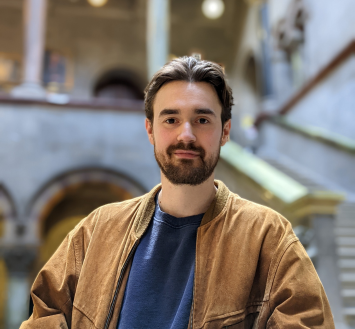
Michael Scholz is an MSc in Business Analytics student at Trinity Business School. After completing his undergraduate in Trinity and then working for five years across a number of analyst roles, Scholz returned to the university to develop his technical skills and strategic business knowledge.
What made you choose Trinity as the place to get your masters?
The course in business analytics exactly matched what I wanted to learn. It is quite unique; some of the modules on it aren’t offered in similar courses at other institutions.
I did my undergraduate degree at Trinity and I had a great time there, so when I thought about going back to study, it was the first place on my mind. I was heavily involved in the student societies -- I founded the Society for International Affairs (SOFIA) and was chair of the International Students Society -- so I knew that if I went back, not only would I have the academic aspect, but the student life that I enjoyed.
After working for five years, coming back to student societies has been great. I enjoy the cultural societies and language societies and travelling around Ireland with other international students.
When you say that the MSc in Business Analytics is unique, could you expand on that?
The course is a great combination of technical and business. On the technical side, you learn programming languages such as Python and R for analytics, forecasting and other business purposes.
Most often, courses with these kinds of data science skills are only on offer in computer science departments. What the Business analytics course provides is the business strategy element. It helps you refine your thinking in terms of how you apply these skills to an organisation and its business problems.
I’ve had the opportunity to develop a deep understanding of analytics, and I don’t think I would have had the time and space to do so while working. Not only do you learn about software tools such as Tableau or Power BI, or visualisation choices, but you learn the theory behind why one visualisation technique is better than another. It gives you the confidence to apply what you’ve learned.
How do you think the course has prepared you for your future career?
Before I started this course, I worked as an analyst and had to learn some elements of the role on the job, such as some of the technical dimensions. It’s difficult to learn this strategic thinking I mentioned before in the workplace. Now, however, I have both the theory and real-world examples that we study during the course, both of which showed me how other businesses and organisations deal with analytics challenges.
I get these ‘Eureka’ moments all the time in terms of how I can apply certain aspects of the course to my career, or to the non-profit start-up I’m hoping to launch.
What do you enjoy about the learning experience offered at Trinity?
I like the fact that a lot of the course is delivered in person. We study the more technical aspects of the course in real depth. Professors will often go through programming code line-by-line. However, there is also a self-learning element, so you end up getting as much out of the course as you put in. I think it strikes this balance well.
The classes are pretty small, around thirty people, so it’s still personal enough for the lecturers to know all of our names. Professors also encourage a lot of peer discussion during class, so we’re interacting with each other every day.
I find this part of the course really eye-opening as my classmates come from very diverse backgrounds and have very diverse viewpoints. When we are put into groups, we often don’t agree on our approach to ethics in a particular case study, for example, so we end up having to think more deeply about why we believe a certain strategy is the best one.
Would you recommend this course to others?
Absolutely. Whether you’re coming in straight from undergraduate or returning to your studies from industry, this course is really useful and unique. Many companies are opening their own analytics departments so these skills are going to be really in demand.
I'm currently working on my dissertation with Professor Frank Barry, Professor of International Business & Economic Development, on the subject of Irish industrial history. We are already seeing some really some really exciting results that we hope to publish about the history of Irish manufacturing in the 20th century. This shows that the dissertation choice is very versatile, as is the subject and application of analytics.


